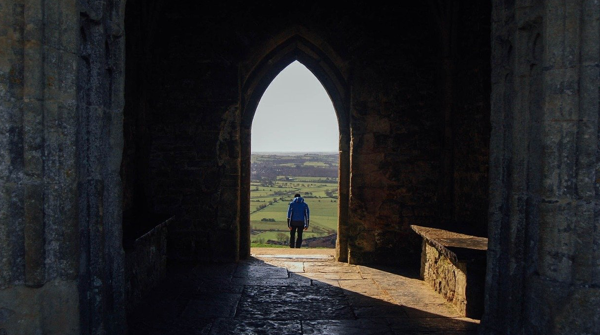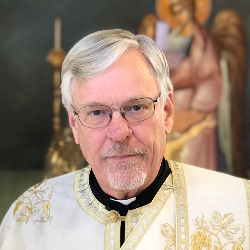
My brothers and sisters, as I will be out of town for Forgiveness Vespers, I ask for your forgiveness for all the sins and stupid things I have done to you and within our parish community. May God have mercy on us all and may we all draw near to Him.
I would also like to provide you a bit of an explanation to Father Evan’s comments a week or so ago about my attraction to the beauty of forgiveness, and more particularly the amazing math behind the power of forgiveness.
At the close of the Sunday of Forgiveness Vespers we are officially at the start of our Journey of Great Lent. As Father Evan explained, our journey should encompass three important traits: humility, repentance, and forgiveness.
At Forgiveness Vespers, the Church gives each of us the opportunity to approach our brothers and sisters in humility; to repent before one another; and to receive and give forgiveness. It is not by chance that this act of asking and giving forgiveness, in humility, is the first sacramental act we do as we enter Great Lent. It is not a stretch to say that our asking and giving forgiveness is one of the most important things we will do during Lent.
Asking and giving forgiveness during Forgiveness Vespers seems no big deal – isn’t it just something that happens between two people? I believe it is much more profound. In fact, the Sunday of Forgiveness reflects the Orthodox Christian life from two perspectives: ours as individuals and our lives as a community. We do ask and grant forgiveness individually, but our acts of asking and granting forgiveness is done within a broader spiritual community. Forgiveness is the result of our individual acts, and when done as a community, we begin to see the beauty of forgiveness, and its potentially infinitive ability to transform lives.
Math can provide a way to get our minds around what is going on. I sense many eyes rolling, much like Fr. Gregory (our priest from MD), and Fr. Evan when I repeatedly related how many acts of forgiveness occurred during Forgiveness Vespers. Math is a way God has given to us to dimly see His eternal realm, a tool He allows us to use to see His beauty and magnificence.
Calculating how many acts of forgiveness during Forgiveness Vespers is straightforward, with relatively easy equations to use. If two people ask and give forgiveness, you have 2 acts of forgiveness (one person requests and gives forgiveness and the other person requests and gives forgiveness from the other). Now here’s where the beauty and magnificence of God’s love shines. If you have 4 people asking and giving forgiveness to each other, the number of acts of forgiveness increases exponentially to 6. If you have 10 people involved, the number of acts of forgiveness would be 46. It is in this exponential power that we can see how forgiveness can overcome any of the problems we see in the world.
What is the effect of asking and giving forgiveness within our parish? If 150 of our parishioners asked and gave forgiveness to each other, our parish would experience over 11,000 acts of forgiveness. If all 350 parishioners participated, the number wouldn’t just double, but would be over 60,000! Think about the impact on our parish of these numbers. What would our parish be like if we were committed to asking and giving forgiveness, not just at Forgiveness Vespers, but every day? And what would happen if this was our mode of life, as our Orthodox Faith suggests - asking and giving forgiveness throughout each day of our lives? Speaking only for me, I know I would be a transformed person, better demonstrating God’s love to Sh. Ina, my family and to each of you in a way I can only vaguely imagine now.
But the act of asking and giving forgiveness has another dimension with the same amazing dynamic. This dimension is how our individual acts of forgiveness are linked together and linked over time.
There is an ancient monastic belief that we should recognize that we are responsible for all that occurs in the world. St. Doretheos of Gaza speaks of this ideal:
“How much joy, how much peace of soul would a person have wherever he went if he was one who habitually accused himself…
… that person would have complete freedom from care.”
My initial reaction was: “Surely this idea is wrong.” It has taken a long time, but I am slowly and dimly beginning to understand the profound wisdom of our Faith. Our acts of giving and receiving forgiveness are not done in a vacuum. Yes, they are individual acts, and are important in and of themselves. But forgiveness from an Orthodox perspective is also a corporate undertaking which have lasting repercussions.
Our actions affect not just us and those we interact with, but they potentially influence others in future. You must be thinking I am nuts! What in the world do you mean? Let me try to explain… My actions today affect those around me immediately. However, if my actions affected someone in my family or the parish profoundly, my actions may well influence others through the actions of those I initially adversely affected. And those follow-up reactions may affect even more people though their subsequent actions and reactions. A potentially long-lasting chain of action and reaction may occur.
You may think this idea is highly speculative. But we only have to open the newspaper or watch the news to see these long chains of beastly actions and reactions being played out in front of us. The demonic actions and reactions of a few at the beginning of the 20th Century in Serbia led to a chain of actions and reactions that resulted in World War I, World War II, the Cold War, and in part what we see in Ukraine today. And it is not just on the world stage we see this spiritual law played out. Many of our inner cities are unlivable due to long series of actions and reactions which did not have the best interest of those living in the inner cities in mind. And more fundamentally spiritually, the action of Adam in eating the forbidden fruit is still being felt in our actions toward one another, and towards God.
If true, what can we do? We must recognize that the act of giving and receiving forgiveness is the most powerful and beautiful tool the Lord has given to us to break the diabolical consequences of these wicked chains of action and reaction. Our acts of forgiveness, though initially individual, have the potential to stop these deadly chains of action and reaction if our acts of forgiveness are multipled within our communities.
Still too hard to believe? A simple case study might help us see the amazing, beautiful and infinite power of God as we ask and give forgiveness to others. The City of Loveland has a population of about 75,000 people. Let’s say 20% (15,000) of those people begin to ask and give forgiveness to a circle of 100 people they know. There would be nearly three-quarters of a million acts of forgiveness between those 15,000 people. Can you imagine what kind of large wake would be created within the Loveland community by this type of love being shown to one another. And what would Loveland (or our parish) be like if those 15,000 (or all in our parish community) committed to giving and receiving acts of forgiveness as a part of their daily lives. Not only individual lives, but whole communities would be transformed!
Our upcoming retreat leader, Fr. Stephen Freeman sums up the importance of asking and giving forgiveness by providing a sense of what the world might be like if we all practice forgiveness. He says:
“In the age to come, you will have no enemies. Forgive them now and enter Paradise!!”
My brothers and sisters, may we all be willing to step out this Lenten Season and ask for the Lord’s help as we begin to live a life characterized by forgiveness.
Dn. Mark O'Dell
Cheesfare Sunday
March 6, 2022
